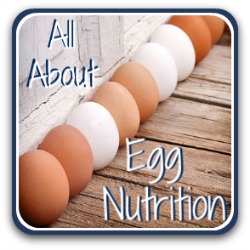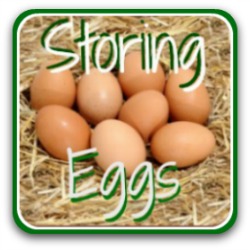Is there nutritional value in our chickens' egg whites?
And do the values differ between backyard and commercially raised flocks?
My sister, who has a degree in food science, has told me for years that whole eggs are the only nutritionally perfect food in the world.
And of course, that's backed up by scientific research. See my resources section if you want to read more widely about it.
Eggs are a perfect balance of protein, vitamins and minerals, with a very low calorie count.
But what if you want to eat just the egg white? Is the nutrition the white contains as good as eating the whole egg?
And do our own backyard chickens' eggs contain even more nutrition than a store-bought egg?
First ... some general facts about egg whites.

The technical name for egg white is 'albumen'.

Egg whites are made up of about 85% water and 15% protein.

In a fresh egg from a chicken with free access to foraging in pasture, the white will be clear with a firmer, thicker layer closest to the yolk and a thinner layer on the outside.

This is one of my hen's eggs. Note the very clear white, and the way the white closest to the yolk stands proud of the rest. This is an example of a healthy, nutritious egg.
 One of my pastured chicken eggs. Note the different thicknesses and clear colour of the white.
One of my pastured chicken eggs. Note the different thicknesses and clear colour of the white.
In an older, non-pastured egg the white will be thinner, runnier and often less clear in colour, with no marked difference in thickness.

Commercially produced egg whites from caged hens have this thinner consistency because the hens have access only to grain.

There is no difference in the nutritional value of coloured eggs. Brown egg whites have exactly the same nutritional value as white, blue, or any other coloured shell.

Contrary to popular belief, the main purpose of the albumen is not to provide nutrition for the developing chick, but to protect the yolk from damage.

Children are the most likely candidates for egg allergies and are usually allergic to the proteins in the white. 68% outgrow the allergy by the age of sixteen .
Eating egg white: what nutrition does it provide?

One large egg white contains only 17 calories and has no cholesterol, no fat, no trans-fat and no carbohydrate. That combination makes them a firm favourite for diets.

Egg white contains a massive 40 different proteins which are critical for the proper formation and functioning of cells in the body. They also help protect from infection.

Egg protein is instantly absorbed by the body, unlike those from other sources which need to be broken down first and whose nutritional value is partly lost in the process.

Egg protein can be bought as powder, but it's not easily absorbed and takes energy to convert, losing around two thirds of its nutritional value in the process.
 It's possible to buy protein powder but the nutritional value is far less.
It's possible to buy protein powder but the nutritional value is far less.
A 'peptide' - one of the components of the egg white proteins - has been found to be as effective in lowering blood pressure as 'Captopril', a well known, widely used drug.

It's not just the amount of protein that counts. Egg whites have the highest nutritional quality of protein found in any food.
Egg white nutrition: the downside.

Egg yolks are very high in Vitamin 'D', which is essential for healthy bone development. There is none at all in the white.

People who are deficient in Vitamin 'D' are at higher risk of heart attack, heart failure, sudden cardiovascular-related death, and stroke.

Few other foods have as high a level of Vitamin 'D' as the yolk - fish and fish oils being the best. Otherwise, it has to be obtained by vitamin pills or fortified foods.

Whites are also lacking in Vitamins 'B', 'B12', 'D' and iron - again, they are contained almost exclusively within the yolk.
Egg white nutrition and weight loss diets: what to do?

Egg whites are a popular way to lose weight because they contain no fat and can be made into a filling, low-cost meal.

However, their lack of more or less everything apart from protein means that eating the whites alone is not a great idea.

The ideal solution here would be to make up nutritious foods such as omelettes or frittatas using both a whole egg and one or two whites to bulk it out.
Eggs, egg whites and nutrition: further reading.
Links in this section are "affiliate links", which means that if you click and buy something, I earn a small commission at no extra cost to you.
I found this book by Sally Fallon very interesting reading. It combines well researched, up to date information about animal fats (including a lot of information about eggs and cholesterol) with some truly delicious recipes.
If you're at all worried about eating egg yolks because of their cholesterol content and can't face wading through medical documents, try this book. I think you'll find it fascinating.
Would you like more information about eggs and nutrition?
Having your own chickens means gorgeous, fresh, pastured eggs from hens who can eat naturally and produce the healthiest eggs imaginable.
Here are some of my other pages full of information about the produce we're lucky enough to be able to gather from our flock, every single day.
Sources.
There is a lot of inaccurate information on the internet about eggs and their nutritional value. Some is out of date, some is just plain wrong.
In order to provide you with good, evidenced-based facts I regularly check my knowledge against the most up-to-date, scientifically based information. These are some of the main sources I have used for this page about egg white nutrition.
'What are proteins?' Genetics Home Reference, December 2013.
'Characterization of ACE-inhibitory peptide associated with antioxidant and anticoagulation properties'. Zhipeng Yu et al; pub. National Center for Biotechnology Information, October 2011.
'Nourishing Traditions'. Sally Fallon, pub. New Trends, 2007.
'Vitamin 'D' deficiency'. M. F. Holick; New England Journal of Medicine, July 2007.
Please note: This page is written as general information only. It is not intended as medical or veterinary advice and should not be taken as such.
If you're worried about your chickens' health, you should always see your veterinarian.















